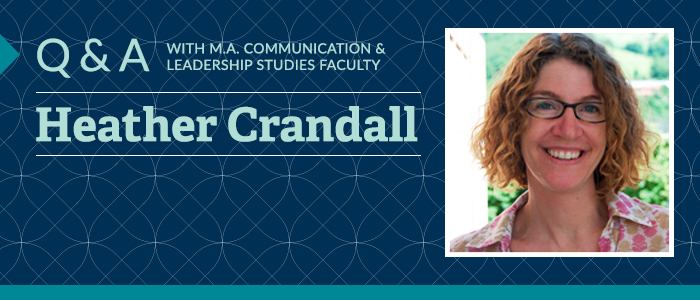Heather Crandall is an Associate Professor in the Master’s Program in Communication and Leadership Studies at Gonzaga University where she teaches courses in theorizing communication, small group communication, interpersonal communication, rhetoric, organizational communication, and media literacy. Currently, she directs the Northwest Alliance for Responsible Media. Dr. Crandall earned her interdisciplinary Ph.D. in American Studies, Communication, and Rhetoric from Washington State University. Her research interests include visual rhetoric and social change, media literacy, and communication pedagogy.
Q: How long have you been teaching for the M.A. in Communication & Leadership Studies program?
In 2004, Dr. John Caputo began the work of putting together the Master’s program. He envisioned graduate students gathering on campus and working through a dynamic, practical curriculum, learning how to solve social problems from a communication perspective. This vision was attractive to students who began enrolling in droves. In 2007, I was hired to help Dr. Caputo build what we call COML. He and I rolled up our sleeves and haven’t rolled them down since. We both have a lot of enthusiasm for what theory and practice can do for students’ lives. We think of our work as fostering effective, ethical communicators who yearn to contribute through their spheres of influence and make our local and global world more just, more humane.
Q: Talk about a project/publication/professional accomplishment you are most proud of.
When it comes to my accomplishments, one stands above the others. I am a first generation college student. The very idea that I have been able to graduate with higher and higher degrees and that those degrees culminate in a life of teaching and scholarship in communication is a kind of miracle. Besides that one, I am proud of my collaborative work with colleagues because of the synergy that comes from shared work. Dr. Carolyn Cunningham and I just won a top paper award at the Media Ecology Conference. I am proud of my students who find their interest area and lose themselves in learning about it. One example is a student who used communication theory to create a community playbook to guide stakeholder efforts to solve problems in his community. Besides these, I help direct the Cagli project, which is our study abroad program in Italy. It is a special experience that transforms the way students think. I received an award from Gonzaga for being an exemplary member of the junior faculty. Finally, all of the work we do in community through the Northwest Alliance for Responsible Media makes me proud.
Q: What area in the discipline of communication are you most passionate about/is your expertise in?
All areas of communication fascinate me. When students tell me that each time they take a class it is their new favorite thing to think about, I can relate. If I have to run through a list it is this: rhetoric, visual rhetoric, social change, and media literacy. Currently teaching interpersonal and small group communication, I would like to help people interpersonally learn the practices of dialogue – how to suspend judgment, how to respond effectively, how to come together not come apart. If conversations are the most important moments of our day, and they are, our lives improve as our conversations improve.
Q: What things we should be thinking about in the field of communication? Notable trends?
While trends are important, they carry with them a sense of transition. Much of what communication theorists discovered about human communication since they began investigating it is still applicable. For example, Kenneth Burke’s ideas from the 1930s on are still relevant as we think about the workings of persuasion. The power of story through the narrative paradigm from the 1980s is another example. Stories form our way of thinking everyday. Agenda-setting and framing are still important ways to think through the dynamics of mass media and society. Trends may alter some of our classic theories, but they rarely cause theoretical revolution. I can give examples of increasingly important trends, too. We are living in an interesting time with our connectedness digitally. From this newer reality, we will necessarily come to think about all kinds of things differently: time, difference, voice, organization, space, power, globalization. Another new trend or challenge is thinking through the communication dynamics of women in leadership and/or increasing women in STEM fields. These trends carry new problems and challenges that the field of communication is perfectly suited to help alleviate.
Q: How does the COML program/GU differ from other programs/schools?
For me, Gonzaga is distinct because of the Jesuit tradition and Ignatian pedagogy. One asks that you meet people where they are, the other accomplishes education through reflection, context, experience, action, and evaluation. Feminist pedagogy, which is teaching with a focus on participatory learning that honors student experience, and encourages critical thinking and open-mindedness is what I use as a guide. Feminist pedagogy dovetails nicely at Gonzaga where the University’s mission focus is on social justice. Besides Gonzaga’s mission and tradition, I was new to the challenge of teaching online. The online part of COML is best described as an online education for students who don’t like online education.
Q: Is there anything that you are currently working on that you would like to share?
I have a number of collaborative projects underway.
With Dr. Caputo, I am working on a paper about political murals and ethical remembering. With Dr. Cunningham and a graduate student, I am working on a paper about social media and nonprofit organizations. I also have a solo project exploring how media images and affect work together to influence collective understanding of far away events like drone strikes or refugee camps. Mass media coverage is more powerful in the absence of our direct experiences.
Q: What book are you reading right now?
